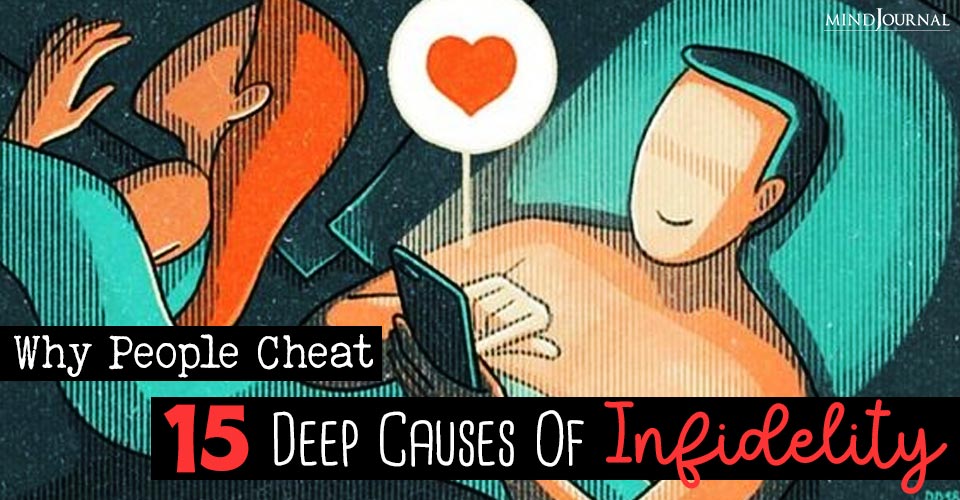What lies behind betrayal and heartbreak? Explore the most common causes of infidelity in relationships and the painful reality of many couples these days.
Why people cheat cannot be explained by a single universal reason. So, we will explore reasons and offer insights on how to move on, heal, and rebuild trust.
According to the American Psychological Association, infidelity is one of the leading causes of divorce and separation
Shockingly, studies also suggest that 50-60% of both men and women will engage in extramarital affairs at least once during their marriage, underscoring the magnitude of this issue.
What is Infidelity?
Cheating or infidelity is the act of engaging in a romantic or sexual relationship with someone outside of a committed partnership or marriage, without the knowledge or consent of one’s partner.
This complex issue can have devastating impacts on both partners involved. It can shatter trust, erode intimacy, and ultimately lead to the breakdown of the relationship.

While there is no single cause of infidelity, several factors can increase the likelihood of one partner straying. Note that cheating is ultimately a personal choice. However, the consequences of cheating can extend beyond the individual and affect others involved.
Given the significant impact of infidelity, let’s delve into the causes of infidelity in relationships.
What are the causes of infidelity in relationships?

1. Sexual Dissatisfaction
This is one of the most common and significant causes of infidelity in a relationship. When one partner feels unfulfilled or neglected in the sexual aspect of their relationship, they may seek out intimacy elsewhere.
This can either occur when one partner has a higher sex drive than the other, or when there is a lack of sexual variety or experimentation in the relationship. Over time, feelings of frustration and resentment can build, leading the dissatisfied partner to look for fulfillment outside the relationship.
Research has suggested that men typically experience greater distress when their partner engages in sexual infidelity, whereas women tend to be more affected by emotional infidelity.
Opportunity: Another major cause of infidelity is opportunity. This can arise when one partner is away from home frequently or when they are exposed to new and exciting experiences and people.
2. Boredom
One of the most common causes of infidelity in marriages in escaping the boredom and monotony. Most couples feel that their current relationship has lost spark. They may crave excitement and novelty, and seek out new experiences with someone else.
However, it is important to note that not everyone who is bored in a relationship will cheat, and not everyone who cheats is doing so because they are bored.
3. Emotional disconnection
One of the biggest risk factors of infidelity is when one partner feels disconnected from the other, they may begin to seek emotional fulfillment elsewhere. This can lead to the development of an emotional or physical affair, which can ultimately lead to the breakdown of the relationship.
Emotional distance can manifest in a number of ways, including a lack of communication, a lack of physical intimacy, and a general feeling of disconnection. When these factors are present in a relationship, it can be difficult to maintain a strong emotional connection.
4. Lack of communication
When couples do not communicate effectively, they may become disconnected from one another and begin to feel emotionally unfulfilled.
This can lead to a sense of loneliness and a desire for intimacy, which can increase the likelihood of seeking an emotional or physical connection with someone else.
Without communication, couples may also fail to identify and address issues that are causing the distance between them. This can lead to unresolved conflicts and resentments that can further erode the relationship.
Related: Which Marriages Survive Infidelity and How To Tell If Yours Is One Of Them
5. Lack of love or passion
One of the deep causes for infidelity in marriages and relationships is a feeling that one’s partner is not “The One” or a lack of passionate love. When couples begin to perceive their relationship as boring, dull, or stagnant, the motivation to seek love and excitement elsewhere can become powerful.
This feeling of a “lack of love” can be a deep cause of infidelity, as individuals may be driven to find emotional and physical fulfillment outside of their current relationship.
6. Low self-esteem
People with personal vulnerabilities like low self-esteem may be more susceptible to the advances of someone else, as they may feel flattered by attention and compliments from a new partner.
This can lead to a sense of excitement and novelty that can be tempting, especially for someone who is feeling unfulfilled or unappreciated in their current relationship.
To prevent infidelity, it’s important to work on building self-confidence and self-worth by practicing self-care and self-compassion and working to identify and address negative thought patterns and beliefs.
7. Unresolved conflicts in the relationship
When couples experience conflicts that are not addressed or resolved, it can create emotional distance and erode the bond of trust between partners. This can lead to a sense of dissatisfaction and a desire for an emotional or physical connection with someone else.
Additionally, unresolved conflicts can create a pattern of negative communication and emotional withdrawal in the relationship. This can further contribute to feelings of loneliness and disconnection, making it easier for a partner to justify seeking fulfillment outside the relationship.
8. Addiction
Being addicted to drugs, alcohol, or other substances may not be directly linked to infidelity but it can still contribute to infidelity.
When one partner is struggling with addiction, their behavior may become erratic or unpredictable, leading to feelings of frustration, anger, and resentment in the other partner. This can make them emotionally or physically unavailable, causing the other partner to seek emotional or physical intimacy elsewhere.
In some cases, addiction can also directly contribute to infidelity. For instance, a person struggling with addiction may seek emotional or physical comfort from someone else when they are triggered by their addiction.
9. Revenge
Many justify cheating on their partner because they were cheated by their partner. It is not uncommon for some individuals to rationalize their own infidelity by pointing to their partner’s previous betrayal.
This response often leads to a harmful cycle of deceit and hurt, as each partner tries to one-up the other. However, resorting to such behavior is immature and unhealthy, and it fails to address the underlying pain caused by the initial affair.
10. Fear of Commitment
Commitment issues can lead individuals to feel trapped or suffocated in a relationship, even if they still love their partner. This feeling of being trapped can lead them to seek a sense of freedom or independence through an affair.
Additionally, when faced with the prospect of long-term commitment they are likely to stray and tend to have the desire to explore other options.
Related 10 Things No One Tells You About Cheating
11. Sexual incompatibility
One of the causes of infidelity in relationships is that partners have different sexual needs or desires, which can create a sense of dissatisfaction and frustration that can lead to seeking fulfillment outside of the relationship.
For example, if one partner desires a more adventurous and varied sexual experience while the other is content with a more routine and predictable approach, this can lead to a sense of sexual incompatibility.
12. Financial issues
When couples experience financial stress or strain, it can create tension and conflict that can spill over into other areas of the relationship.
If one partner feels overwhelmed by financial pressures or perceives the other partner as irresponsible or unreliable with money, this can create a sense of frustration and disconnection.
Similarly, if one partner is experiencing financial success while the other is struggling, this can create feelings of inadequacy and insecurity that can make them vulnerable to seeking affirmation and validation elsewhere.
13. Physical distance
When partners are physically separated due to work, travel, or other factors, they may be more susceptible to infidelity. This can be due to feelings of loneliness or a lack of physical intimacy.
It can also create a sense of anonymity and secrecy, as partners may feel less accountable for their actions when they are not in the presence of their significant other.
14. Exposure to environments or cultures that normalize it
In some cultures or social circles, infidelity may be viewed as acceptable or even expected behavior, particularly for men. This can create a sense of social pressure or peer influence that can make individuals more likely to engage in infidelity.
Similarly, exposure to media or entertainment that glamorizes or normalizes infidelity can also contribute to a sense of normalization or desensitization to the behavior.
15. Prior history of infidelity
Finally, one of the common causes of infidelity in relationships is a prior history of cheating.
Cheating can be a recurring issue in a relationship when one partner has a prior history of cheating. This can create a pattern of behavior that is challenging to overcome and increase the likelihood of future infidelity.
How To Deal With Infidelity In Marriages And Relationships?
Dealing with infidelity can be a complex and emotionally challenging process, but there are several steps that can help couples work through the aftermath and move forward in a healthy way:
- Acknowledge the infidelity: Both partners need to be honest and upfront about what happened, and take responsibility for their actions and emotions.
- Seek professional help: Couples therapy or individual therapy can be helpful in processing the emotions and challenges of infidelity, and in developing a plan for moving forward.
- Take time to heal: It’s important to give yourself time and space to process your emotions and work through the pain of betrayal.
- Rebuild trust: This can involve being transparent and honest about your actions and feelings, as well as being willing to make changes and commitments to rebuild trust in the relationship.
- Communicate openly and honestly: It’s important to be open and honest with your partner about your feelings and needs, and to actively work on building emotional intimacy and connection in the relationship.
Related: Surviving Infidelity Together: 5 Ways Couples Can Move On From The Pain
The takeback
There is no one right way to handle infidelity: Each situation is unique, and the best course of action will depend on the individuals involved and their goals for the relationship.
Some couples may be able to repair the relationship after infidelity, while others may choose to end the relationship and move on. But what is important is that you take care of your own feelings and prioritize your needs first.











Leave a Reply